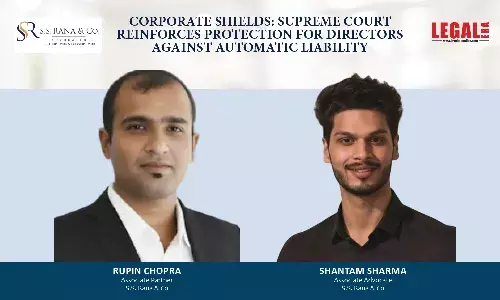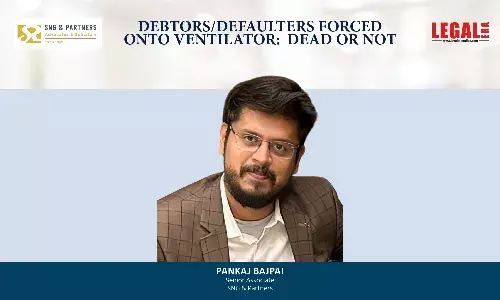Frivolous Shareholder Activism or Corporate Democracy?

FRIVOLOUS SHAREHOLDER ACTIVISM OR CORPORATE DEMOCRACY? It will be a travesty of justice and equity if we allow shareholders with dubious and motivated credentials and holding miniscule shares, to force companies to furnish sensitive records Recently Mr M Damodaran, Former SEBI Chief made a strong pitch for protection of shareholders' interests (reported by Business Line dated 21st July 2022)...
FRIVOLOUS SHAREHOLDER ACTIVISM OR CORPORATE DEMOCRACY?
It will be a travesty of justice and equity if we allow shareholders with dubious and motivated credentials and holding miniscule shares, to force companies to furnish sensitive records
Recently Mr M Damodaran, Former SEBI Chief made a strong pitch for protection of shareholders' interests (reported by Business Line dated 21st July 2022) by way of:
(i) "Simpler Annual Reports so as to enable shareholders to understand the contents;
(ii) Harmonious and non-ritualistic conduct of Annual General Meetings of shareholders (AGMs) and timely conduct of AGMs
(iii) Better presence of all Directors at AGMs;
(iv) Larger presence by Institutional Investors who should ask tougher questions in the interest of small shareholders;
(v) With e-voting, a number of shareholders feel that an AGM is a mere formality since the result of the voting is apparent even before the Meeting;
(vi) AGMs should be accessible to more than 1000 shareholders and there should not be any restrictions ;
(vii) AGMs to be streamed using platforms like Youtube, or the company website so that more shareholders can attend
However, Mr Damodaran has surprisingly not covered the other side of the story which exposes the sham of shareholder participation and the mindless wastage of resources involved in the conduct of physical AGMs and printing of physical Annual Reports. I also don't agree with the view that "With e-voting, a number of shareholders feel that an AGM is a mere formality since the result of the voting is apparent even before the Meeting
Listed Corporates have for long been experiencing a repeated and never ending vexatious approach by some unscrupulous and dubious shareholders laden with vested interests and a perverse desire to extort benefits from a company, by deliberately filing frivolous litigation to obstruct the smooth conduct of Annual General Meetings (AGMs), threatening company executives with legal action for some so called violations, insisting upon inspecting statutory records to force companies into submission to their demands and filing malicious complaints with the Regulators against the company on fabricated grounds. All this in the garb of 'protection of minority interests, corporate democracy etc. It is also an unfortunate fact that there are many unscrupulous companies which have nurtured such shareholders by illegal gratification, freebies, gifts etc to ensure that their AGMs are conducted. AGMs have become ritualistic because technology has drastically changed the scenario. Shareholders have regular access to quarterly disclosures of the results, other disclosures, Press Releases, investor meet ups and presentations, which are all uploaded on the websites of the companies and Exchanges. The FIIs, the Institutional shareholders and the other big ticket retail shareholders attend the investor meets after the quarterly Board meetings and raise all the critical questions regarding performance, projections etc. and regularly follow the research reports which are company and Industry specific. Thus the AGM has become a boring, ritualistic event to discuss the historical events gone by and is basically of no consequence to big stake holders
Let us look at some of the ground realities which many of the companies would have experienced while dealing with such shareholders:
Listed Corporates have for long been experiencing a repeated and never ending vexatious approach by some unscrupulous and dubious shareholders laden with vested interests and a perverse desire to extort benefits from a company, by deliberately filing frivolous litigation to obstruct the smooth conduct of Annual General Meetings (AGMs), threatening company executives with legal action for some so called violations, insisting upon inspecting statutory records to force companies into submission to their demands and filing malicious complaints with the Regulators against the company on fabricated grounds
Physical AGMs (which were mandatorily required a few years back before the Covid -19 norms ) could be better described as a "dramas /shows" at the company expense. If we pick up the attendance statistics of such AGMs, then it emanates that the shareholders who attend are not the typical minority (with genuine concerns for minority) but those who hold shares in single digits and who are commonly seen at almost 80% of the AGMs being held in a city or town. The strategy has been to purchase shares in single digits in each company in the same city and then attend each of these AGMs for a different purpose ( obviously not genuine participation). These shareholders ( often referred to as the 'troublesome' lot )would approach the Company Secretary of the listed company before the AGM and demand gratification with money, gift coupons etc. The bargain was to ensure that they would allow the AGM to go smoothly and without unnecessary questions. They will shower praises and recite poetry/ shayaris lauding the performance of the company and garland the Chairman with flowers purchased on company expense. The resolutions were passed by a show of hands (which itself was a questionable practice with no specific account of the exact number of votes for or against). The Institutional investors, FIIs, MFs and other big-ticket holders never participated in the AGMs for these reasons. In the event of the company not obliging or yielding to the pre-AGM demands of such shareholders, they would create a ruckus at the AGM, put the management to inconvenience by demanding Poll (a cumbersome and time-wasting process in those days) and creating chaos to disrupt the proceedings. The Co Secys- were always under severe pressure to ensure that the AGM passes off smoothly without any embarrassing situations. After gifts were banned by a MCA circular, the shareholders would pounce upon the snacks/tea/coffee and soft drinks made available during the AGM. They would literally carry thermos, bottles, and bags to fill up as many snacks/soft drinks as possible and then sell them. After the Covid-19 restrictions which brought in the mandatory conduct of AGMs through video conferencing companies have saved huge money hitherto being incurred on travel costs, arrangements etc. Also, Directors are not inconvenienced since they can attend the meetings while sitting at their homes or offices. The wastage of time and energy on traveling to other cities has been eliminated. This has ensured better attendance by the Directors. The best part is that any unruly shareholder or shareholder making illegal demands of gratification from the Company can be immediately muted during the AGM or kept out of the speakers' list. Shareholders can be restricted from speaking beyond 2-3 minutes, thereby ensuring that only genuine questions are posed. Another big advantage of e-AGMs is that the mandatory processes of e-voting and remote e-voting have ensured better participation by the FIIs, Institutional shareholders, M.Fs etc who are in a position to vote on resolutions. All these are compelling reasons to justify mandatory conduct of Annual General Meetings by video conferencing ( e-AGMs) without any exceptions or exemptions.
Coming to Annual Reports, the Covid-19 pandemic made it mandatory to issue Digitalised Annual Reports (as against the paper based physical annual reports). This has proved to be a catalyst in the sense that it has almost eliminated the wastage of time, money, and most importantly, the paper involved in printing lakhs of annual reports to be despatched to the shareholders. Any activity that avoids paper ensures that lesser number of trees are cut thereby fostering better environment protection. This makes the strongest case for altogether banning physical reports. This is a much-needed transformation/ metamorphosis to contribute our little bit for environment protection.
Some case laws relating to the menace of "Habitual frivolous shareholder litigants"
It has been rightly remarked by some top global corporate lawyers that Shareholder Democracy' can mask Abuses. Shareholder activism has gained popularity in the recent past, but the hidden agenda or dubious motives behind such activism can be understood only when we refer to the following case laws :
(1) Anil Kumar Poddar vs Reliance Industries Ltd and Ors. on 23 March 2016 (Delhi H.C in W.P.(C) 5939/2015)
There is a serious need to re-look at those provisions of the Cos Act which have been abused and misused by such unscrupulous shareholders holding shares in single digits or in miniscule numbers to demand inspection of records and file frivolous petitions to obstruct the smooth functioning of companies.
In this case one Mr Anil Kumar Poddar – a shareholder of RIL holding only two (2) shares out of a total of 32.35 crores issued shares, i.e., holder of only 0.00000000006811% of the equity share capital had filed a writ petition seeking a direction to prohibit RIL from holding its Annual General Meeting (for short "AGM") on the ground it has violated Section 134 of the Companies Act, 2013 inasmuch as it has not disclosed to its investors/shareholders true and correct state of affairs in its Annual Report and Director's Report for the year 2014-15. It was alleged in the petition that RIL is adamant in holding its AGM in violation of statutory provisions to perpetuate a fraud and to legalize siphoning of Rs. 18,000 crores without disclosing the true and correct state of affairs to the petitioner and other stakeholders/shareholders. Incidentally, as per counter affidavit filed by RIL Poddar was a 'habitual frivolous litigant' who had filed more than 149 cases against RIL.
The Company Law Board ( now NCLT) had declined relief to Poddar on the grounds that he had approached the Company Law Board with unclean hands.
The Hon'ble Delhi H.C. threw out Poddar's petition on the ground that that principle of corporate democracy requires that meeting of shareholders should normally not be interdicted. Placing reliance on the decision of the Hon'ble S.C. in Life Insurance Corporation of India v. Escorts Ltd. and others, AIR 1986 SC 1370, the Delhi H.C. held that an injunction cannot be granted to restrain the holding of a general meeting to remove a director and appoint another.
(2) Anil Kumar Poddar Vs Bonanza Industries Ltd [2015] 132 SCL 47 (CLB) Mumbai
Mr. Anil Kumar Poddar, a shareholder in Bonanza Industries Ltd (holding only 10 shares), had filed for inspection of the respondent company's statutory registers and recordsunder Section 20 of the Companies Act, 2013 which included minutes, registers, annual returns, and financials of the companies against payment of charges for providing such records. The respondent company denied the applicant the said files as they claimed his actions were of vexatious nature and his intention was to extract money from them. As such this issue was brought up in front of the Company Law Board by Poddar seeking to pass an order directing the respondent company to allow the inspection of the statutory register and records of the company and also to pass an order awarding the applicant exemplary damages. Poddar demanded inspection of the statutory register and records of the company in his capacity as a shareholder, as such a right was vested in him by the statute. The respondent company claimed that the applicant was a professional investor who acquired very nominal or negligible shareholding of various listed companies purely to create nuisance and frighten the directors with criminal liability and illegally extract money from them. The applicant in this current circumstance had only acquired 10 shares of the respondent company to harass the company and frighten the directors of criminal action and to illegally extract money.
The Mumbai Bench of the Company Law Board acknowledged that approximately 150 applications pending were made against various companies by the applicant. They also found that the information that the applicant was seeking could have been easily obtained from the Ministry of Corporate Affairs portal and that there was no real need to repeatedly pester the company. The Bench further referred to the case of Phillips Carbon Black Limited & Ors. v. Anil Kumar Poddar & Anr. where the applicants were barred from exercising their rights as shareholders as they had approached the Board with unclean hands. Due to these reasons, the Company Law Board found the intention of the applicant to be mala fide and dismissed the application.
Background Information regarding Anil Kumar Poddar
The applicant had filed more than 100 criminal complaints against companies situated in Kolkata, before the Court of the Metropolitan Magistrate. The Khaitan & Co. team of the Kolkata office then filed a suit against Poddar and Mahato, on behalf of these companies, under Order 1 Rule 8 of the Code of Civil Procedure, 1908 preventing them from misusing their rights as a shareholder.
It was submitted that the suit had also been advertised in the Economic Times, whereby several other companies had also jointed as plaintiffs in the suit and had obtained similar orders. The aggrieved companies procured an interim order whereby Poddar and Mahato had been restrained from exercising right as shareholders. The Calcutta High Court had also observed that the rights of inspection of document should be exercised in good faith, taking into consideration the company's best interests. The Kolkata High Court passed an order restraining the applicants from exercising their rights as shareholders. Similarly, various judgments by the Company Law Board have previously barred Anil Kumar Poddar from harassing listed companies.
Similarly in the other case of Dabur India Ltd. v. Anil Kumar Poddar (2002) 108 Comp Cas 293, the CLB had held that a company may be directed under subsection (4) not to circulate notice for removal of a director if the provisions of section 284 of the Act are being abused by the shareholder. This legal proposition has been consistently reiterated from time to time in a series of decisions by the Company Law Board, including that Housing Development Finance Corporation v. Suresh Chandra V. Parekh (2002) 112 Comp Cas 650 (CLB).
Conclusion
There is a serious need to re-look at those provisions of the Cos Act which have been abused and misused by such unscrupulous shareholders holding shares in single digits or in miniscule numbers to demand inspection of records and file frivolous petitions to obstruct the smooth functioning of companies. It will be a mockery of the term "minority shareholders' interests," if we treat such shareholders as minority who call themselves to be aggrieved and oppressed by the majority. The Cos Act has protected the rights of minority shareholders against mismanagement and oppressive acts of the majority, but then the term minority has been defined to mean shareholders holding at least 10% of the paid-up share capital. The same criteria should have been applied to the right to inspect highly confidential and sensitive statutory records of companies. It will be a travesty of justice and equity if we allow shareholders with dubious and motivated credentials and holding miniscule shares, to direct companies to furnish such sensitive records. In the era of e-governance and with the various regulators requiring companies to make continuous disclosures with changes on their websites, there does not seem to be any logic for a shareholder demanding documents as in the instant case.
Disclaimer – The views expressed in this article are the personal views of the author and are purely informative in nature.





